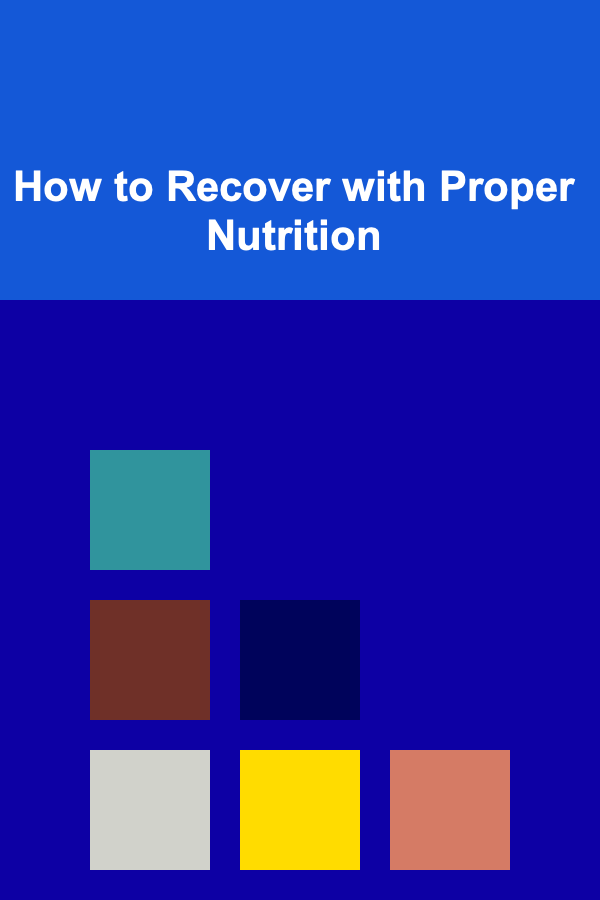
How to Recover with Proper Nutrition
ebook include PDF & Audio bundle (Micro Guide)
$12.99$9.99
Limited Time Offer! Order within the next:

Recovery is a fundamental aspect of life, whether you are an athlete pushing your body to its limits, a person recovering from an illness or surgery, or someone simply trying to regain energy after a long day of work or physical activity. While rest and sleep are essential components of recovery, the role of nutrition cannot be overstated. Nutrition is not just about fueling the body, but also about facilitating repair, reducing inflammation, and optimizing overall function. In this article, we will explore how to recover effectively through proper nutrition, providing a comprehensive look at the essential nutrients, their roles in recovery, and strategies to optimize your diet for the best results.
The Importance of Nutrition in Recovery
Recovery is not just a passive process; it is an active rebuilding of the body. Proper nutrition supports this process by providing the necessary building blocks for muscle repair, immune function, energy restoration, and cellular regeneration. The body requires certain nutrients in specific amounts and timing to achieve the best recovery outcomes. Without adequate nutrition, recovery may be impaired, leading to prolonged fatigue, increased risk of injury, and weakened immune response.
Proper nutrition during recovery can:
- Repair and rebuild tissues: Protein and amino acids help repair damaged muscles, tendons, and ligaments.
- Reduce inflammation: Anti-inflammatory foods can reduce muscle soreness and promote faster healing.
- Restore energy: Carbohydrates and fats are crucial for replenishing glycogen stores and providing sustained energy.
- Support immune function: Nutrients like vitamins and minerals help strengthen the immune system, ensuring you stay healthy during recovery.
- Prevent nutrient deficiencies: Balanced meals can help prevent deficiencies in key nutrients, which can delay recovery.
Key Nutrients for Recovery
1. Protein
Protein is often the first nutrient that comes to mind when discussing recovery. This macronutrient plays a central role in the repair and growth of tissues, especially muscles. After exercise or injury, muscle fibers experience microtears, and protein is needed to repair these tears and build new muscle tissue.
How Protein Aids Recovery:
- Muscle Repair: Protein provides amino acids, which are the building blocks of muscle tissue. Consuming enough protein after exercise promotes muscle repair and reduces muscle soreness.
- Increased Muscle Protein Synthesis: Consuming protein post-exercise enhances muscle protein synthesis (MPS), which is the process by which the body builds new muscle tissue.
Best Sources of Protein for Recovery:
- Animal Sources: Chicken, turkey, lean beef, fish, eggs, and dairy products like Greek yogurt and cottage cheese.
- Plant-Based Sources: Legumes, beans, lentils, quinoa, tofu, tempeh, and plant-based protein powders.
The ideal amount of protein for recovery depends on individual factors such as body weight, exercise intensity, and goals. A general guideline is to consume 1.2 to 2.0 grams of protein per kilogram of body weight per day, with an emphasis on consuming protein within 30 minutes to two hours after exercise.
2. Carbohydrates
Carbohydrates are the body's primary source of energy. During physical activity, your muscles rely on stored glycogen, which is derived from carbohydrates, to fuel performance. After intense exercise, it's crucial to replenish glycogen stores to prepare the body for future activity and avoid fatigue.
How Carbohydrates Aid Recovery:
- Restore Glycogen: After exercise, carbohydrate consumption replenishes glycogen stores, ensuring the body has energy for the next workout or activity.
- Improve Protein Utilization: Carbohydrates help shuttle protein into muscle cells and improve the body's ability to utilize protein for muscle repair.
Best Sources of Carbohydrates for Recovery:
- Whole Grains: Brown rice, quinoa, oats, barley, and whole wheat pasta provide slow-releasing carbohydrates.
- Fruits and Vegetables: Bananas, apples, sweet potatoes, berries, and leafy greens offer natural sugars and fiber.
- Legumes: Lentils, beans, and chickpeas provide both carbohydrates and protein.
The general recommendation for carbohydrate intake post-exercise is 1 to 1.5 grams of carbohydrates per kilogram of body weight to promote optimal glycogen replenishment.
3. Fats
Fats are an essential part of a balanced diet and play a role in recovery by helping the body absorb fat-soluble vitamins (A, D, E, and K), regulating inflammation, and supporting cell membrane integrity. Healthy fats are also a critical energy source for longer periods of moderate-intensity exercise.
How Fats Aid Recovery:
- Reduce Inflammation: Omega-3 fatty acids, found in fish and some plant-based oils, have anti-inflammatory properties that can aid in reducing muscle soreness and speeding up recovery.
- Support Hormonal Balance: Healthy fats help regulate the production of hormones such as testosterone, which plays a role in muscle repair and growth.
Best Sources of Healthy Fats for Recovery:
- Omega-3 Rich Foods: Fatty fish (salmon, sardines, mackerel), flaxseeds, chia seeds, and walnuts.
- Monounsaturated Fats: Olive oil, avocado, nuts, and seeds.
- Polyunsaturated Fats: Sunflower oil, soybean oil, and certain nuts.
4. Vitamins and Minerals
Vitamins and minerals are micronutrients that are often overlooked when it comes to recovery, but they are essential for a wide range of physiological functions. They help in the repair process, support energy metabolism, and reduce inflammation.
Key Vitamins and Minerals for Recovery:
- Vitamin C: Important for collagen formation and tissue repair. Found in citrus fruits, berries, bell peppers, and broccoli.
- Vitamin D: Supports muscle function and immune health. Can be obtained from sunlight exposure and foods like fortified milk, fatty fish, and egg yolks.
- Magnesium: Helps with muscle function and prevents cramps. Found in leafy greens, nuts, seeds, and whole grains.
- Potassium: Replenishes electrolytes lost through sweat during exercise. Found in bananas, potatoes, and spinach.
- Zinc: Supports immune function and helps with the repair of muscle tissues. Found in meat, shellfish, beans, and nuts.
In general, maintaining a balanced and varied diet rich in fruits, vegetables, whole grains, and lean proteins will ensure that you are getting the vitamins and minerals necessary for optimal recovery.
5. Hydration
Water is perhaps the most underrated aspect of recovery. Proper hydration is critical for maintaining performance, reducing muscle cramping, and supporting recovery. Dehydration can lead to fatigue, poor muscle function, and an impaired ability to recover after exercise or physical activity.
How Hydration Aids Recovery:
- Replenish Fluids: Sweating during exercise depletes water and electrolytes, which need to be replaced after activity.
- Facilitate Nutrient Transport: Water helps transport nutrients like protein and carbohydrates to muscle cells for recovery.
- Prevent Cramping and Fatigue: Staying hydrated helps prevent dehydration-related issues like muscle cramps and post-exercise fatigue.
In addition to water, electrolyte drinks or natural sources like coconut water can help replenish lost minerals (sodium, potassium, magnesium) during long workouts or intense activity.
Timing Your Nutrition for Optimal Recovery
The timing of your nutrition can significantly affect how quickly and effectively your body recovers. Research suggests that the period immediately after exercise --- known as the "anabolic window" --- is crucial for nutrient absorption, especially for protein and carbohydrates.
1. Post-Workout Meal (Within 30-60 Minutes)
After exercise, the body is primed to absorb nutrients for muscle repair and glycogen replenishment. Aim to consume a combination of protein and carbohydrates within 30 minutes to an hour post-exercise. This is the time when muscle protein synthesis (MPS) is most active, and consuming the right nutrients during this window can maximize recovery.
A good post-workout meal or snack might include:
- A protein shake with fruit.
- A turkey sandwich on whole-grain bread.
- A smoothie with yogurt, spinach, and berries.
2. Pre-Sleep Meal (Before Bed)
Having a small meal or snack before bed can help with muscle repair during sleep. Consuming slow-digesting protein sources, such as casein (found in dairy), can provide a steady stream of amino acids overnight to support recovery.
A good pre-bedtime snack could include:
- Cottage cheese with a handful of nuts.
- A small bowl of Greek yogurt with berries.
- A protein shake with a slow-digesting protein source.
Conclusion
Recovering with proper nutrition is not just about eating the right foods --- it's about understanding how those foods work in concert to repair, rebuild, and restore your body. Whether you're an athlete recovering from a tough workout, someone healing from an injury, or just looking to improve your overall well-being, providing your body with the right nutrients at the right times is key to optimizing recovery.
Remember, there is no one-size-fits-all approach to recovery nutrition. Everyone's body is different, and your individual needs will vary depending on factors like activity level, goals, and health conditions. By focusing on a balanced, nutrient-dense diet that includes the right combination of protein, carbohydrates, fats, vitamins, minerals, and hydration, you will be on the path to quicker, more effective recovery.

How to Organize a Family Care Plan for Seniors
Read More
How to Sell Digital Products Successfully for Social Media Marketers: An Actionable Guide
Read More
Make Money by Teaching Deep Learning: Creating Online Courses
Read More
How to Interpret Mythological Trees and Plants
Read More
How To Explore Next-Generation Sequencing for Diagnostics
Read More
How To Cultivate Empathy Through Stoic Practice
Read MoreOther Products

How to Organize a Family Care Plan for Seniors
Read More
How to Sell Digital Products Successfully for Social Media Marketers: An Actionable Guide
Read More
Make Money by Teaching Deep Learning: Creating Online Courses
Read More
How to Interpret Mythological Trees and Plants
Read More
How To Explore Next-Generation Sequencing for Diagnostics
Read More